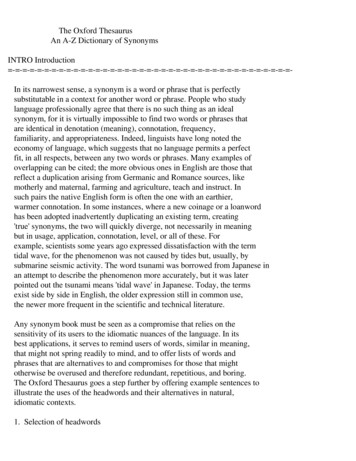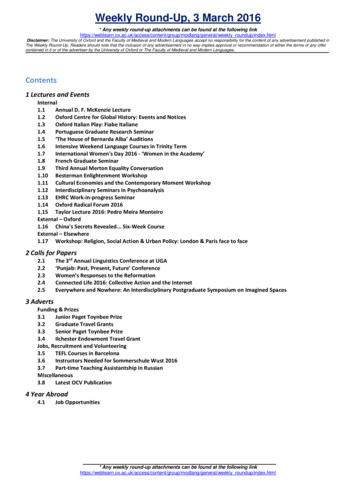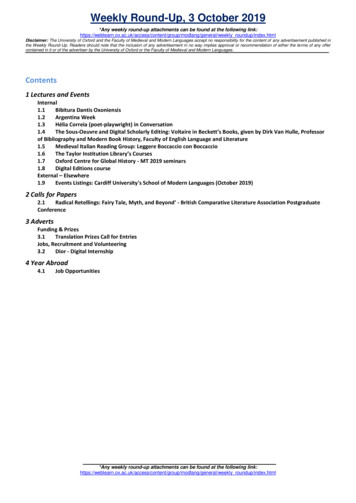
Transcription
The Oxford Handbook of Clinical Psychology
O X F O R D L I B R A RY O F P S Y C H O L O G Yeditor-in-chiefPeter E. Nathanarea editorsClinical PsychologyDavid H. BarlowCognitive NeuroscienceKevin N. Ochsner and Stephen M. KosslynCognitive PsychologyDaniel ReisbergCounseling PsychologyElizabeth M. Altmaier and Jo-Ida C. HansenDevelopmental PsychologyPhilip David ZelazoHealth PsychologyHoward S. FriedmanHistory of PsychologyDavid B. BakerMethods and MeasurementTodd D. LittleNeuropsychologyKenneth M. AdamsOrganizational PsychologySteve W. J. KozlowskiPersonality and Social PsychologyKay Deaux and Mark Snyder
OXFORDL I B R A RYOFEditor-in-ChiefPSYCHOLOGYpeter e. nathanThe Oxford Handbookof Clinical PsychologyUpdated EditionEdited byDavid H. Barlow1
1Oxford University Press is a department of the University of Oxford.It furthers the University’s objective of excellence in research, scholarship,and education by publishing worldwide.Oxford New YorkAuckland Cape Town Dar es Salaam Hong Kong KarachiKuala Lumpur Madrid Melbourne Mexico City NairobiNew Delhi Shanghai Taipei TorontoWith offices inArgentina Austria Brazil Chile Czech Republic France GreeceGuatemala Hungary Italy Japan Poland Portugal SingaporeSouth Korea Switzerland Thailand Turkey Ukraine VietnamOxford is a registered trademark of Oxford University Pressin the UK and certain other countries.Published in the United States of America byOxford University Press198 Madison Avenue, New York, NY 10016 Oxford University Press 2011First issued as an Oxford University Press paperback, 2014.All rights reserved. No part of this publication may be reproduced, stored in aretrieval system, or transmitted, in any form or by any means, without the priorpermission in writing of Oxford University Press, or as expressly permitted by law,by license, or under terms agreed with the appropriate reproduction rights organization.Inquiries concerning reproduction outside the scope of the above should be sent to theRights Department, Oxford University Press, at the address above.You must not circulate this work in any other formand you must impose this same condition on any acquirer.Library of Congress Cataloging-in-Publication DataThe Oxford handbook of clinical psychology / edited by David H. Barlow.p.; cm.—(Oxford library of psychology)Other title: Handbook of clinical psychologyIncludes bibliographical references and index.ISBN 978–0–19–536688–4 (hardcover); 978–0–19–932871–0 (paperback)1. Clinical psychology–Handbooks, manuals, etc. I. Barlow, David H. II. Title: Handbook of clinicalpsychology. III. Series: Oxford library of psychology.[DNLM: 1. Psychology, Clinical–methods. 2. Mental Disorders–diagnosis.3. Mental Disorders–therapy. 4. Psychotherapy–methods. WM 105 O98 2010]RC467.2.O94 2010616.89–dc2220100040649 8 7 6 5 4 3 2 1Printed in the United States of Americaon acid-free paper
Short ContentsOxford Library of Psychologyâ viiAbout the Editorâ ixContributorsâ xiContentsâ xviiChaptersâ 1–920Indexâ 921v
Oxford Library of PsychologyThe Oxford Library of Psychology, a landmark series of handbooks, is publishedby Oxford University Press, one of the world’s oldest and most highly respectedpublishers, with a tradition of publishing significant books in psychology. Theambitious goal of the Oxford Library of Psychology is nothing less than to spana vibrant, wide-ranging field and, in so doing, to fill a clear market need.Encompassing a comprehensive set of handbooks, organized hierarchically, theLibrary incorporates volumes at different levels, each designed to meet a distinctneed. At one level are a set of handbooks designed broadly to survey the majorsubfields of psychology; at another are numerous handbooks that cover importantcurrent focal research and scholarly areas of psychology in depth and detail.Planned as a reflection of the dynamism of psychology, the Library will grow andexpand as psychology itself develops, thereby highlighting significant new researchthat will impact on the field. Adding to its accessibility and ease of use, the Librarywill be published in print and, later on, electronically.The Library surveys psychology’s principal subfields with a set of handbooksthat capture the current status and future prospects of those major subdisciplines.This initial set includes handbooks of social and personality psychology, clinicalpsychology, counseling psychology, school psychology, educational psychology,industrial and organizational psychology, cognitive psychology, cognitive neuroscience, methods and measurements, history, neuropsychology, personality assessment, developmental psychology, and more. Each handbook undertakes to reviewone of psychology’s major subdisciplines with breadth, comprehensiveness, andexemplary scholarship. In addition to these broadly conceived volumes, theLibrary also includes a large number of handbooks designed to explore in depthmore specialized areas of scholarship and research, such as stress, health andcoping, anxiety and related disorders, cognitive development, or child and adolescent assessment. In contrast to the broad coverage of the subfield handbooks, eachof these latter volumes focuses on an especially productive, more highly focusedline of scholarship and research. Whether at the broadest or most specific level,however, all of the Library handbooks offer synthetic coverage that reviews andevaluates the relevant past and present research and anticipates research in thefuture. Each handbook in the Library includes introductory and concluding chapterswritten by its editor to provide a roadmap to the handbook’s table of contents andto offer informed anticipations of significant future developments in that field.An undertaking of this scope calls for handbook editors and chapter authors whoare established scholars in the areas about which they write. Many of the nation’s andworld’s most productive and best-respected psychologists have agreed to edit Libraryhandbooks or write authoritative chapters in their areas of expertise.vii
For whom has the Oxford Library of Psychology been written? Because of itsbreadth, depth, and accessibility, the Library serves a diverse audience, includinggraduate students in psychology and their faculty mentors, scholars, researchers,and practitioners in psychology and related fields. Each will find in the Library theinformation he or she seeks on the subfield or focal area of psychology in whichthey work or are interested.Befitting its commitment to accessibility, each handbook includes a comprehensive index, as well as extensive references to help guide research. And becausethe Library was designed from its inception as an online as well as a print resource,its structure and contents will be readily and rationally searchable online. Further,once the Library is released online, the handbooks will be regularly and thoroughly updated.In summary, the Oxford Library of Psychology will grow organically to provide athoroughly informed perspective on the field of psychology, one that reflects bothpsychology’s dynamism and its increasing interdisciplinarity. Once publishedelectronically, the Library is also destined to become a uniquely valuable interactive tool, with extended search and browsing capabilities. As you begin to consultthis handbook, we sincerely hope you will share our enthusiasm for the more than500-year tradition of Oxford University Press for excellence, innovation, andquality, as exemplified by the Oxford Library of Psychology.Peter E. NathanEditor-in-ChiefOxford Library of Psychologyviiioxford library of psychology
About the EditorDavid H. BarlowDavid H. Barlow received his Ph.D. from the University of Vermont in 1969. Heis a Professor of Psychology and Psychiatry at Boston University, where he foundedthe Center for Anxiety and Related Disorders and now serves as the Center’sDirector Emeritus.Dr. Barlow is the recipient of the 2000 American Psychological Association(APA) Distinguished Scientific Award for the Applications of Psychology. He isalso the recipient of the 2008 Career/Lifetime Achievement Award from theAssociation for Behavioral and Cognitive Therapies and the 2000 DistinguishedScientific Contribution Award from the Society of Clinical Psychology of theAPA.He is past-president of the Society of Clinical Psychology of the APA and theAssociation for Behavioral and Cognitive Therapies, past-editor of several journals, and currently Editor-in-Chief of the Treatments That Work series for OxfordUniversity Press. He was Chair of the American Psychological Association TaskForce of Psychological Intervention Guidelines, and was a member of the DSM-IVTask Force of the American Psychiatric Association. He is also a diplomat in clinical psychology for the American Board of Professional Psychology and maintainsa private practice.ix
ContributorsJonathan S. AbramowitzDepartment of PsychologyUniversity of North CarolinaChapel Hill, NCLesley A. AllenDepartment of PsychiatryUniversity of Medicine and Dentistry ofNew JerseyRobert Wood Johnson Medical SchoolPiscataway, NJBarbara L. AndersenDepartment of PsychologyOhio State UniversityColumbus, OHDerek R. AndersonDepartment of PsychologyOhio State UniversityColumbus, OHMartin M. AntonyDepartment of PsychologyRyerson UniversityToronto, ONAllison J. ApplebaumDepartment of PsychologyBoston UniversityBoston, MAJacques P. BarberDerner Institute of AdvancedPsychological StudiesAdelphi UniversityGarden City, NYDavid H. BarlowCenter for Anxiety and RelatedDisordersDepartment of PsychologyBoston UniversityBoston, MADonald H. BaucomDepartment of PsychologyUniversity of North CarolinaChapel Hill, NCAdam BernsteinDepartment of PsychologyUniversity of California, Los AngelesLos Angeles, CAJames F. BoswellDepartment of PsychologyBoston UniversityBoston, MAAndrea BradfordDepartment of Family and CommunityMedicineBaylor College of MedicineHouston, TXTimothy A. BrownCenter for Anxiety and Related DisordersBoston UniversityBoston, MAMolly R. ButterworthPsychology DepartmentUniversity of UtahSalt Lake City, UTJenna R. CarlCenter for Anxiety and Related DisordersDepartment of PsychologyBoston UniversityBoston, MALouis G. CastonguayDepartment of PsychologyPennsylvania State UniversityState College, PAChristine B. ChaDepartment of PsychologyHarvard UniversityCambridge, MABruce F. ChorpitaDepartment of PsychologyUniversity of California, Los AngelesLos Angeles, CALillian Comas-DíazTranscultural Mental Health InstituteWashington, DCxi
Jonathan S. ComerDepartment of PsychiatryBoston UniversityBoston, MAPatrick H. DeLeonPast PresidentAmerican Psychological AssociationDavid DeMatteoDepartment of PsychologyDrexel UniversityPhiladelphia, PAAnne DePrinceDepartment of PsychologyUniversity of DenverDenver, COLisa M. DiamondPsychology DepartmentUniversity of UtahSalt Lake City, UTLinda A. DimeffBehavioral Tech Research, Inc.Seattle, WAHalina J. DourDepartment of PsychologyHarvard UniversityCambridge, MAV. Mark DurandDepartment of PsychologyUniversity of South Florida, St. PetersburgSt. Petersburg, FLMaryanne EdmundsonDepartment of PsychologyUniversity of KentuckyLexington, KYCharles F. EmeryDepartment of PsychologyOhio State UniversityColumbus, OHNorman B. EpsteinMarriage and Family Therapy ProgramUniversity of MarylandCollege Park, MDMariana K. FalconierDepartment of Human DevelopmentVirginia Tech UniversityBlacksburg, VADolores Gallagher-ThompsonStanford University School of MedicineStanford, CAxiicontributorsMarvin R. GoldfriedDepartment of PsychologyStony Brook UniversityStony Brook, NYNaomi GoldsteinDepartment of PsychologyDrexel UniversityPhiladelphia, PALeslie S. GreenbergDepartment of PsychologyYork UniversityToronto, ONCatherine L. GrusAmerican Psychological AssociationWashington, DCLeonard J. HaasDepartment of Family & PreventiveMedicineUniversity of Utah School of MedicineSalt Lake City, UTAllison HartDepartment of PsychologyDrexel UniversityPhiladelphia, PALaurie HeatheringtonDepartment of PsychologyWilliams CollegeWilliamstown, MAKirk HeilbrunDepartment of PsychologyDrexel UniversityPhiladelphia, PAJustin M. HillVA Boston Healthcare SystemBoston, MAJason M. HollandVA Palo Alto Health Care SystemStanford University School of MedicineStanford, CAHeather K. HoodDepartment of PsychologyRyerson UniversityToronto, ONJohn HunsleyDepartment of PsychologyUniversity of OttawaOttawa, ON
Jonathan D. HuppertDepartment of PsychologyThe Hebrew University of JerusalemJerusalem, IsraelRyan J. JacobyDepartment of PsychologyUniversity of North Carolina atChapel HillChapel Hill, NCBradley E. KarlinDepartment of Veterans AffairsCentral OfficeWashington, DCTerence M. KeaneVA National Center for PosttraumaticStress DisorderBoston University School of MedicineBoston, MAPhilip C. KendallDepartment of PsychologyTemple UniversityPhiladelphia, PAMary Beth KenkelCollege of Psychology and Liberal ArtsFlorida Institute of TechnologyMelbourne, FLJennifer S. KirbyDepartment of PsychologyUniversity of North CarolinaChapel Hill, NCPhillip M. KleespiesVA Boston Healthcare SystemBoston, MANaomi KoernerDepartment of PsychologyRyerson UniversityToronto, ONRobert F. KruegerDepartment of PsychologyUniversity of MinnesotaTwin CitiesBeth A. LewisSchool of KinesiologyUniversity of MinnesotaMinneapolis, MNOvsanna LeyferCenter for Anxiety and Related DisordersBoston UniversityBoston, MAAndrew K. LittlefieldDepartment of PsychologyTexas Tech UniversityLubbock, TXJulie K. LynchAlbany Neuropsychological AssociatesAlbany, NYStephanie Marcello DuvaUniversity of Medicine and Dentistryof New Jersey-University BehavioralHealth CareDivision of Schizophrenia ResearchPiscataway, NJBess H. MarcusProgram in Public HealthBrown UniversityProvidence, RIJulia A. MartinezDepartment of PsychologyColgate UniversityHamilton, NYBrian P. MarxVA National Center for PosttraumaticStress DisorderBoston University School ofMedicineBoston, MAEric J. MashDepartment of PsychologyUniversity of CalgaryCalg
publishers, with a tradition of publishing significant books in psychology. The ambitious goal of the Oxford Library of Psychology is nothing less than to span a vibrant, wide-ranging field and, in so doing, to fill a clear market need. Encompassing a comprehensive set of handbooks, organized hierarchically, the











